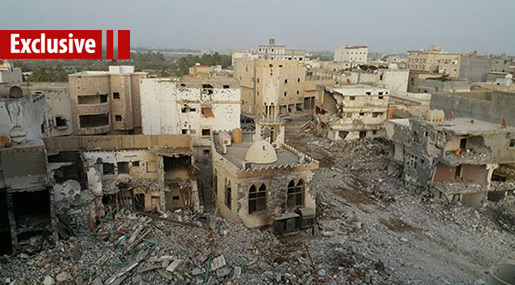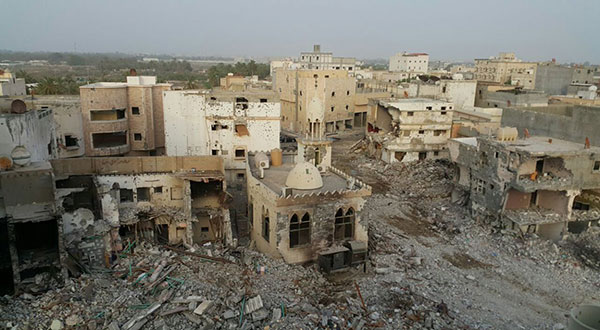
The Longest Military Campaign inside Saudi Arabia Goes Largely Unnoticed By the World

Darko Lazar
For months, everything on the streets of Saudi Arabia's northeastern town of Awamiyah has been indiscriminately and ruthlessly shot at - including women and children. Their only crime: demanding reforms from the monarchy in Riyadh.

Their punishment is swift and brutal. They are violently huddled out of their homes, cleansed, erased, like they were never there to begin with. And as their blood is spilled, their heritage is eviscerated, their history trampled upon by shells and bulldozers.
In the town's 400-year-old al-Musawara neighborhood, the wind is left howling through emptiness after entire blocks were flattened. But the regime in Riyadh tells the world there is no need for alarm - all of this is nothing more than a demolition project and the elimination of hideouts for ‘terrorists' and ‘drug dealers'.
After all, the population of Awamiyah was given ample warning. As the siege intensified in late July, local residents reported that they were told to either ‘leave or die'.
Most chose the former. But even leaving did not guarantee anyone's safety.
Three-year-old Sajaad Mohamed Abu Abdallah was in his family's car when an armored vehicle randomly opened fire on a crowd of civilians on June 12. A bullet that entered the car through the left rear door, hit the toddler in the right hand, then travelled through his waist and exited his body. After suffering in the Dammam Maternity and Children's Hospital for nearly two months, he finally succumbed to his wounds on August 8, becoming only one of dozens of victims.
Saudi Arabia's Shiite majority Eastern Province - where Awamiyah is located - is no stranger to the loss of innocent lives. The region has witnessed a surge in anti-regime protests since 2011, which the ruling monarchy attempted to crush through the jailing and executions of dissidents, including the late Sheikh Nimr al-Nimr.
One of the Saudi dissidents and the head of the Gulf Institute For Human Rights, Dr. Ali Al-Ahmad, pointed out that the latest "attack on Awamiyah is the largest and longest military campaign inside the country since the establishment of Saudi Arabia in 1932."
A former lecturer at the University of Bahrain, Colin Cavell, believes that the explanation for the recent spike in violence is simple.
"Simply put [Riyadh wants] to suppress the population and to intimidate the people within Awamiyah," Cavell explained. "To try to let them know that there will be repercussions if they demand democracy, if they demand freedom of speech, if they demand freedom of association, if they demand freedom of religion."
"The Saudi government does not tolerate any opposition to its dictatorial rule," Cavell added.
And why should it? Riyadh enjoys the full support of its western partners, who are more often than not, complicit in the shooting.
Arms sales & international human rights law
Aside from the graphic pictures of Sajaad's final days in hospital, activists have also posted countless images and online videos showing the transformation of Awamiyah from a tranquil town into a "war zone".
Even leading western newspapers like the Independent reported on the unprecedented destruction after satellite imagery emerged, showing the contrast between Awamiyah in February and July.
But for much of the international community, this is proof of nothing. After all, Awamiyah is not Aleppo where images of death and destruction shared by Al Qaeda "activists" were more than enough to produce outrage and condemnation from just about every western official who could get a hold of a microphone.
Asked about the carnage in Awamiyah, the Spokesperson for the UN Secretary-General would only say that the world body was "not in a position to confirm ... [the media reports] independently."
When pressed by the reporter, Stephane Dujarric repeated the same old spiel about how everything that Riyadh does "should be in compliance with international human rights law".
Of course, nothing that Riyadh does is ever in compliance with international human rights law, thanks in no small part to the political cover and military assistance that it receives from Washington and London.
"The United States or Canada or the UK; all of these countries have provided training, weaponry and assistance to the Saudi forces, to oppress their people," Ali Al-Ahmad said. "In fact they tried to support the monarchy while maintaining the appearance of civility and democracy."
The western contribution to the military operation in Awamiyah has not gone unnoticed either.
Armored vehicles like the one used to shoot three-year-old Sajaad may be draped with Saudi flags but the Gurkha RPVs are made in Canada's Ontario.
The vehicles sold to Saudi Arabia by Canada were at the forefront of the deadly siege on Awamiyah. Countless online videos showed the Gurkha RPV in action.
The revelations threw the spotlight on Ottawa's recent decision to sign off on a USD 13 billion arms deal with the kingdom, making Saudi Arabia Canada's second biggest arms buyer.
Similarly, both the US and the UK have sold a record amount of arms to Saudi Arabia in recent months.
In May, US president Donald Trump signed his now infamous USD 110 billion package, which would eventually reach USD 350 billion over the next decade. The deal features everything from integrated air defense systems, Black Hawk helicopters and precision-guided munitions.
Meanwhile, the UK sold Riyadh nearly USD 4 billion worth of bombs and cluster munitions, which are extensively used against civilian areas in Yemen.
And as is the case with the atrocities in that country, western officials will continue to wait for ‘independent confirmation' before launching futile ‘reviews' and voicing their condemnation of "all parties to the conflict".
Source: Al-Ahed



